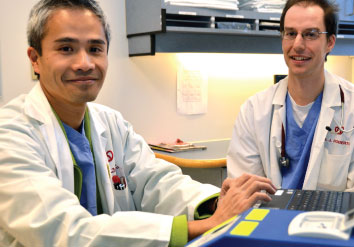
In 2012, the promise of using genetic information to personalize patient care made a leap forward at the Ottawa Heart Institute, with the introduction of the RAPID GENE test. Patients who get a cardiac stent to open a blocked artery must take medication to prevent blood clots. Clopidogrel is most commonly used for this purpose, but up to 40% of people carry a genetic variation that prevents them from properly metabolizing the drug.
In emergency situations, standard screening methods take far too long. RAPID GENE was developed as a bedside test to identify patients who can’t take clopidogrel. The test requires only a cheek swab and minimal user training.
A clinical trial published in 2012 in The Lancet highlighted its effectiveness in the clinical setting.
At the time, Derek So, MD, the Heart Institute cardiologist who led the development of RAPID GENE, said “The advantage of being able to perform personalized therapy is that we get the best of both worlds. For the people who do react properly to clopidogrel, we give them clopidogrel. And for the people who don’t, we give them the stronger medications. By doing that in the general population, you could actually prevent more bleeding outcomes, and at the same time, also decrease costs by directing the right medication to the right people.”
Our 40th Anniversary Flashback series will continue throughout 2016.
Learn More
- Read the original RAPID GENE coverage from The Beat
- See recent coverage of the technology at CTVNews
- Our 40th Anniversary

